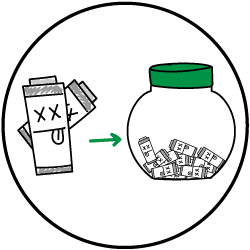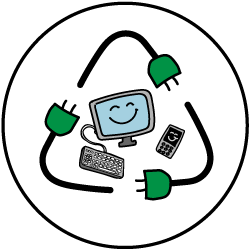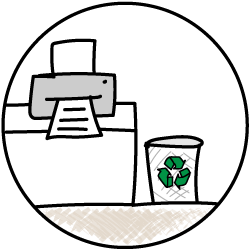6 Ways to Reuse and Recycle in Your Workplace
-
Category
Studio-Workplace, Innovation -
Posted By
Craig Flandermeyer -
Posted On
Nov 15, 2019
At Schmidt Associates, sustainability is something we strive for in each architecture and engineering project we do. We work with clients to implement designs that are energy efficient, use renewable energy sources, gain LEED certification if desired, or even reuse existing structures and materials when possible.
This focus on sustainability is, in part, why we started a company-wide recycling program—which, as our company’s sustainability advocate, I spearhead.
Reducing your organization’s carbon footprint doesn’t have to be a major undertaking or require a robust recycling budget. There are a lot of small efforts we make every day in our office that are easy to implement.
If you’re looking to ramp up your office recycling efforts, this list is a great place to start.
1. Put recycling bins next to every printer.
How many times have you accidentally printed 20 copies of a report instead of 2? By weight, paper and cardboard are the largest potential recycling targets in an office environment. Even if your company has largely gone digital to reduce your paper consumption, remember to recycle the paper you do use.
At Schmidt Associates, we have a paper recycling bin under every employee’s desk. Not there yet? Start by putting one next to every printer or in every major work area. Also consider adjusting your default print settings to print double-sided to reduce paper waste.

2. Properly dispose of dead batteries.
The heavy metals and corrosive materials used to make batteries are toxic and harmful to the environment. From the AAA alkaline batteries in your computer mouse to the button cell battery in your watch, most batteries are recyclable.
Start with the most common type of battery used in your office, likely alkaline. Make a bin available to employees to collect the batteries and take them to be recycled as needed. Be sure to clearly label bins, as different types of batteries may need to be recycled separately.
 3. Provide reusable utensils for lunch.
3. Provide reusable utensils for lunch.
Even disposable plates and cups made from recycled material cannot be re-recycled once used. Plus, they require a lot of energy to manufacture. Stock your office break room or kitchen with reusable silverware, plates, and coffee mugs to encourage employees to ditch disposable products.
Be sure to remind your staff to return these items when they’re finished (I’m known to host fork-return drives at our office). If you don’t have a dishwasher on site, provide dish soap and a sponge for cleaning.

4. Use aluminum cans to give back to your community.
Encourage employees to recycle their soda, energy drink, and cold-pressed coffee cans by collecting and turning them in for cash. At the end of the year, use the deposit money you receive to make a donation to a local charity your team cares about or to do some other good deed. You can even organize a neighborhood cleanup to boost your collection efforts. This not only improves your company’s carbon footprint, but it also allows you to reinvest in your community.
How much you’ll get for your cans varies depending on where you live and where you take your collection. States with deposit laws (like Michigan, Iowa, California, and a handful of others) mandate a standard rate per can. States without such laws (like Indiana) don’t regulate the deposit rate. Recycling plants that accept cans in these states will typically pay per pound of aluminum, and rates vary by plant and by the day. It may be a relatively slow earn, but with consistency and some creative aluminum-hunting, it can definitely pay off.

5. Host an electronics recycling drive.
As a company, you should be appropriately recycling any old or broken electronics. But your employees may be stashing their defunct computers, keyboards, or cell phones in the garage because they have no idea what else to do with them. Organize an electronics recycling drive and dispose of these devices for your staff. It’ll be a chore they’ll thank you for!

6. Reduce food waste.
Apples, bananas, and oranges aren’t just great afternoon snacks, their cores and peels are also compostable! Reduce office food waste by giving employees somewhere to chuck their biodegradable food scraps. You can create an office compost program that feeds your rooftop garden, supports a local community garden, or provides fertilizer for employees’ own landscaping efforts.
Be sure to give staff clear guidelines on what can and cannot be composted. Coffee grounds and paper coffee filters are a great compost resource, for example. They can also help keep the office cleaner by keeping coffee drippings out of the trash.
Also consider reusing bulk package food containers from client luncheons or other events to allow employees to store leftovers rather than throw them away.
The Key to Successful Recycling
Even with the best of intentions, if you don’t remain consistent and communicate how to recycle properly, your program could become a flop. Getting buy-in from your staff and clearly expressing your goals is key to making your efforts effective.
I recommend designating a recycling advocate who is a familiar, consistent face for staff to go to with questions and who can provide gentle reminders about the program. It’s important that this person values the goal at hand, so seek out a volunteer.
Also make sure you know the regulations and resources available in your community to make the most of your efforts. For information on where to recycle various items, check your county or town’s website. You can also use a search tool like Recycle Nation or Earth911 to find recycling locations for almost anything. Be aware that recycling companies sometimes change the materials they accept based on the market. Stay up to date on what they’ll take, and if one company says no, keep looking!
Have questions or need more ideas? Use our Contact form to let me know.






 3. Provide reusable utensils for lunch.
3. Provide reusable utensils for lunch.

